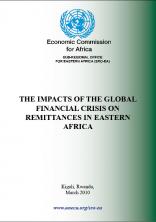The Impacts of the Global Financial Crisis on Remittances in Eastern Africa

The view that the relatively low economies of the sub-Saharan Africa may not be affected by the global economic and financial crisis due to their minimal integration to the world giants of the financial markets is no longer valid as the impact of the crisis has affected heavily the continent. Until the onset of the largely financial crisis, the African continent had been experiencing what is now come to be known as the commodity boom with growing demand and rising prices of agricultural products. That demand has since fallen to low levels and faced reduced prices in the global market due to reduced consumptions. Tourist numbers have not been as high as projected as residents of the developed world try to cope with the crumbling economies. Economic growth in Africa slowed to 5.1 percent in 2008, down from 6.0 percent in 2007 and it is expected to decelerate further in 2009 (UNECA, 2009). In Eastern Africa, economic growth slowed down from 6.3 percent in 2007 to 5.3 percent in 2008, mainly as impact of the global crisis.
It is believed that the global financial crisis will likely and substantially set back progress towards poverty reduction and the achievement of the Millennium Development Goals. It is predicted that Official Development Assistance (ODA) to Africa and the realization of standing commitments may have been put at risk in the near future. Even assistance for non-traditional donors, including remittances from African in the Diaspora may therefore likely become even more critical.
Remittances from migrant workers have increased considerably in recent years and now constitute the second largest external capital inflows to developing countries. It is estimated that migrants sent some $300 billion in 2008 back home to developing countries, a figure much larger than the total ODA flows for the same year. For several small economies, remittances account for more than 20 percent of GDP. Estimates suggest that remittances in Sub-Saharan Africa represent about 5 percent of GDP or 27 percent of export receipts (UNCTAD 2008).
The findings of this study reveals not only the resilient nature of remittances but also the increasingly prominent role its playing in boosting the foreign exchange earnings of their respective countries.